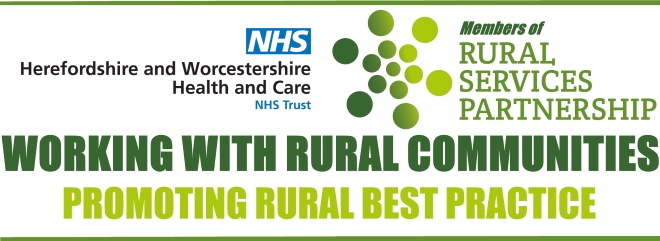T: 01822 851370 E: [email protected]
Visit RSN Survey about life in rural England to find out more.
Rural district nursing is not for the faint-hearted

Worcestershire is a rural county of valleys, rivers and patchwork fields, bordered by the Malvern Hills. Surrounded by outstanding natural beauty, it is easy to forget the challenges those living in rural communities might face when accessing healthcare.
Herefordshire and Worcestershire Health and Care NHS Trust provides a range of services, including care and support at home through a variety of community-based teams which support both physical and mental health needs of its population. It includes its integrated Neighbourhood Teams which brings together a range of professionals including district nurses, therapists, GPs, and social care staff providing care and treatment to more vulnerable patients in their own homes. The aim is to deliver proactive and responsive care to reduce unnecessary hospital admissions or repeat GP appointments.
Alongside having to adapt to the challenges COVID has provided, staff in those Neighbourhood Teams working in the most rural parts of the county must also overcome the obstacles of working in a rural environment.
Beth Ferris, Senior Community Nurse, EBBI Neighbourhood Team said: “Rural district nursing is not for the faint hearted; every day can be a challenge. From the distance we travel, lone nursing, and to the skills required to meet a wide scope of patient care for the most vulnerable and isolated in society. We are professionals who use our experience, knowledge and autonomy in often complex circumstances.”
Working in counties prone to adverse weather conditions, including severe annual flooding, the Neighbourhood Teams must be able to adapt to changing routes, and make crucial decisions to provide vital healthcare, alongside ensuring their own safety.
Beth added: “We must have our wits about us for weather conditions; especially in the winter months when snow and/or floods could cause dangerous driving conditions. Patience, when we are held up in the summer months by tractors and trailers causing us to get behind in our workload.
“We feel tired yet reassured that no matter how challenging our day has been, we have made a positive difference to somebody's day, acknowledging tomorrow is another day which will be filled with learning opportunities.”
However, it is not only the poor weather conditions that can make the provision of rural healthcare more challenging
Beth said: “We must be proactive in rural areas by recognising the difficulty to find addresses like named rather than numbered properties. We must use our initiative to utilise apps on our phones or to stop and ask the local postman who is always a guaranteed help.
“It may be a day when we see no other members of our team but receive a reassuring call asking if we’re ok. The strength of the tremendous team back at base is often our first port of call when support or advice is needed.”



